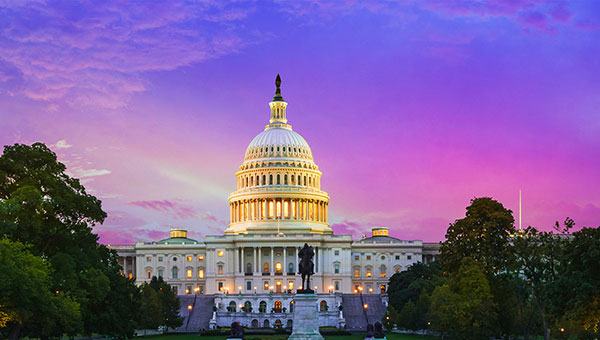President Trump signed the One Big Beautiful Bill Act (OBBBA) on July 4, with many tax and spending provisions offering advantages for consumer product companies and manufacturers. The following provides an overview of significant business, international and individual provisions.
Businesses
Research & Experimentation
Under the Tax Cuts and Jobs Act (TCJA), qualifying domestic research and experimentation (R&E) expenditures have been required to be capitalized (starting in the 2022 tax year) and amortized over five years, rather than being deducted in full in the year of the expenditure. Foreign REE is required to be capitalized and amortized over a 15-year period.
Bonus Depreciation
The bonus depreciation rate has been decreasing from 100% since 2022. OBBBA makes the first-year bonus depreciation provisions of section 168(k) permanent. The allowance is increased to 100% for property acquired and placed in service after Jan. 19, 2025. These provisions allow businesses a continued favorable expense deduction timing for property types that qualify under section 168.
Qualified Production Property
Manufacturers can claim 100% deduction for the cost of new “qualified production property,” including real property, defined as any property used in a “qualified production activity” (“the manufacturing, production, or refining of a qualified product” which “result[s] in a substantial transformation of the property comprising the product.”). A “qualified product” means any tangible personal property if such property is not a food or beverage prepared in the same building as a retail establishment in which such property is sold. It applies to non-residential real property other than “real property which is used for offices, administrative services, lodging, parking, sales activities, research activities, software development or engineering activities, or other functions unrelated to the manufacturing, production, or refining of tangible personal property.” The change applies to qualified property placed in service after the date of enactment and before Jan. 1, 2031.
Business Interest Limitation
OBBBA reinstates the section 163(j) interest deduction limitation using a calculation of income that excludes the deduction for depreciation, amortization, or depletion. The provision is for taxable years beginning after Dec. 31, 2024. The legislation permanently modifies the definition of “motor vehicle” for purposes of the floor plan financing interest and floor plan financing indebtedness definitions to include trailer homes and campers. These provisions are for taxable years beginning after Dec. 31, 2024. The legislation contains a new ordering rule to calculate 163(j) limit prior to other interest capitalization. In addition, interest capitalized under sections 263(g) or 263A(f) is not deemed interest for the limitation.
Excess Business Losses Limitation
The Excess Business Loss (EBL) rule applies to non-corporate taxpayers and is defined as the amount by which deductions (excluding net operating losses and IRC section 199A Qualified Business Income deductions) related to trades or businesses exceed income from such trade or business. Such net business losses are currently allowed only up to certain thresholds (which for 2025 are $626,000 for joint filers and $313,000 for other filers). Any business losses above these thresholds are EBLs. Any disallowed EBL is carried forward and is treated as a net operating loss in future years, subject to an 80% of taxable income limitation. Under prior law, the EBL rules were scheduled to expire after 2028. The OBBBA makes the EBL rule permanent.
Qualified Opportunity Zones (OZ)
OBBBA includes a permanent rolling 10-year designation beginning Jan. 1, 2027, maintains the current OZ designation process, and provides strengthened eligibility requirements.
Employee Retention Tax Credit
No credit allowed for claims involving Q3 2021 (and Q4 2021 in certain cases – collectively the “affected quarters”) filed after Jan. 31, 2024. This shortens the previous statute of limitations by approximately 14 ½ months. The IRS now has six years (increased from five) to examine and deny or claw back erroneous or excessive ERTC claims for the affected quarters. Also, for employers whose ERTC claims for affected quarters are fully or partially denied, employers have six years from the filing date of their ERTC claim to claim refunds of income tax paid related to any previously disallowed wage deductions tied to their disallowed ERTC claims. Taxpayers may still be eligible for refunds or to assert statutes of limitations for other quarters.
Businesses with International Operations
Global Intangible Low-taxed Income (GILTI)
OBBBA modifies the section 250 deduction for GILTI to 40%. The foreign tax credit reduction is 10%. This results in an effective tax rate on GILTI to 14%. The deduction for QBAI in determining a U.S. shareholder’s GILTI inclusion is eliminated. Additionally, the allocation of expenses is limited (before foreign tax credits) for taxable years beginning after Dec. 31, 2025.
Foreign-derived Intangible Income (FDII)
Similarly, for domestic corporations, OBBBA reduces to 33.34% the currently applicable 37.5% deduction for FDII, which was scheduled to decline to 21.875% after 2025. Therefore, the effective tax rate on FDII is slightly increased to 14%, consistent with GILTI. The new rules apply to tax years starting after Dec. 31, 2025.

Understanding the One Big Beautiful Bill Act
Visit Resource CenterIndividuals
SALT Cap
Under prior TCJA provisions, individuals who itemize deductions may only deduct up to $10,000 in state, local, and foreign income, property, or sales and use taxes (the SALT cap). Over the past several years, most states with an individual income tax have enacted laws that allow owners of pass-through entities to circumvent this limit by imposing an entity-level tax on the business.
OBBBA increases the limit to $40,000 with phaseouts beginning at $500,000 of income. The increase is only temporary for five years. In 2026, the thresholds increase by 1% or to $40,400 for households with income under $505,000. The thresholds continue to increase by 1% each year through 2029, after which the SALT limit is permanently reduced to $10,000.
Pass-Through Entity Tax (PTET) Deduction
The legislation essentially maintains the current status quo regarding PTET deductions.
Section 1202 Small Business Stock
OBBBA provides a permanent tiered gain exclusion for qualified small business stock (QSBS) of 50% for QSBS held for at least three years, 75% for QSBS held for at least four years, and 100% for QSBS held for at least five years. The change only applies to stock originally issued after the date of enactment. The gain excluded under the three- and four-year rules would not be treated as a preference item for purposes of the AMT if the stock were acquired after Sept. 27, 2010.
The per-issuer cumulative exclusion limitation increases from $10 million to $15 million, with an annual inflation adjustment increase. Taxpayers who fully use the limitation as inflation-adjusted in any tax year are not eligible for additional inflation adjustments. The conforming amendments ensure married filing separate taxpayers benefit from the adjusted inflation limitations on a per-issuer basis. In addition, OBBBA increases the “aggregate gross asset” calculation under IRC Section 1202(d) to $75 million from $50 million, which is also subject to an annual inflation adjustment.
Charitable Contributions
The legislation creates a permanent deduction for taxpayers who do not itemize their deductions. For tax years beginning after Dec. 31, 2025, non-itemizing taxpayers can claim a deduction of up to $1,000 if a single filer ($2,000, married filing jointly) for specific charitable contributions. For taxpayers who itemize their deductions, the legislation limits otherwise allowable charitable contribution deductions to amounts exceeding a 0.5% floor over the contribution base (generally, adjusted gross income without regard to net operating losses) for tax years beginning after December 31, 2025. New carryover rules apply to amounts not eligible for deduction. The legislation also permanently extends the increased 60% contribution limit for cash gifts to qualified charities.
Limitation of Tax Benefit of Itemized Deductions
OBBBA permanently repeals the “Pease” limitation on itemized deductions and creates a new formula to apply to taxpayers only in the highest tax bracket, generally capping the benefit of otherwise allowable itemized deductions at 35%
Qualified Business Income Deduction
Currently, an individual can potentially get a deduction of up to 20% of qualified business income. OBBBA makes the QBI deduction, which was scheduled to expire after 2025, permanent.
Provisions Affecting Trusts, Estates and Gifts
Tax Rates
The Act permanently extends TCJA income tax rates and brackets for estates and trusts.
Exemption
The unified estate and gift tax exemption is made permanent to an inflation-indexed $15 million per individual for taxable years beginning after Dec. 31, 2025. The generation-skipping transfer tax exemption is also permanently increased to an inflation-indexed $15 million.
Looking Ahead
Now that OBBBA is law, these significant changes can be game changers for consumer product companies and manufacturers that are investing in their businesses, innovating products and manufacturing applications, and looking to manage cash flow.
By understanding what’s in the OBBBA now, you will be better positioned to act fast, restructure smartly, and maximize your tax strategy as early as 2025. We will continue to monitor these changes and share insights.
For a more comprehensive explanation of OBBBA, visit our OBBBA Resource Center..
For more information about the industrial sector provisions in the budget proposal, please contact our Consumer & Industrial Products professionals.
© Copyright CBIZ, Inc. All rights reserved. Use of the material contained herein without the express written consent of the firms is prohibited by law. This publication is distributed with the understanding that CBIZ is not rendering legal, accounting or other professional advice. The reader is advised to contact a tax professional prior to taking any action based upon this information. CBIZ assumes no liability whatsoever in connection with the use of this information and assumes no obligation to inform the reader of any changes in tax laws or other factors that could affect the information contained herein. Material contained in this publication is informational and promotional in nature and not intended to be specific financial, tax or consulting advice. Readers are advised to seek professional consultation regarding circumstances affecting their organization.
“CBIZ” is the brand name under which CBIZ CPAs P.C. and CBIZ, Inc. and its subsidiaries, including CBIZ Advisors, LLC, provide professional services. CBIZ CPAs P.C. and CBIZ, Inc. (and its subsidiaries) practice as an alternative practice structure in accordance with the AICPA Code of Professional Conduct and applicable law, regulations, and professional standards. CBIZ CPAs P.C. is a licensed independent CPA firm that provides attest services to its clients. CBIZ, Inc. and its subsidiary entities provide tax, advisory, and consulting services to their clients. CBIZ, Inc. and its subsidiary entities are not licensed CPA firms and, therefore, cannot provide attest services.















